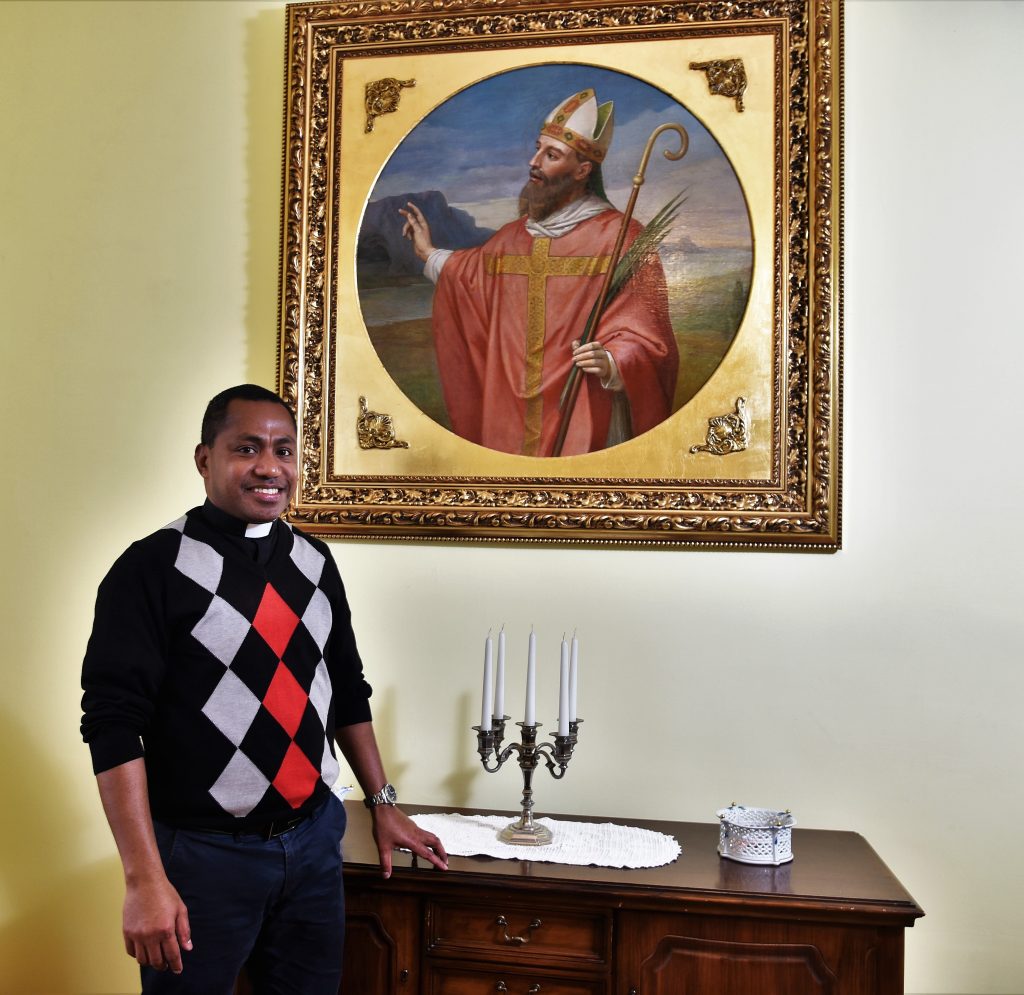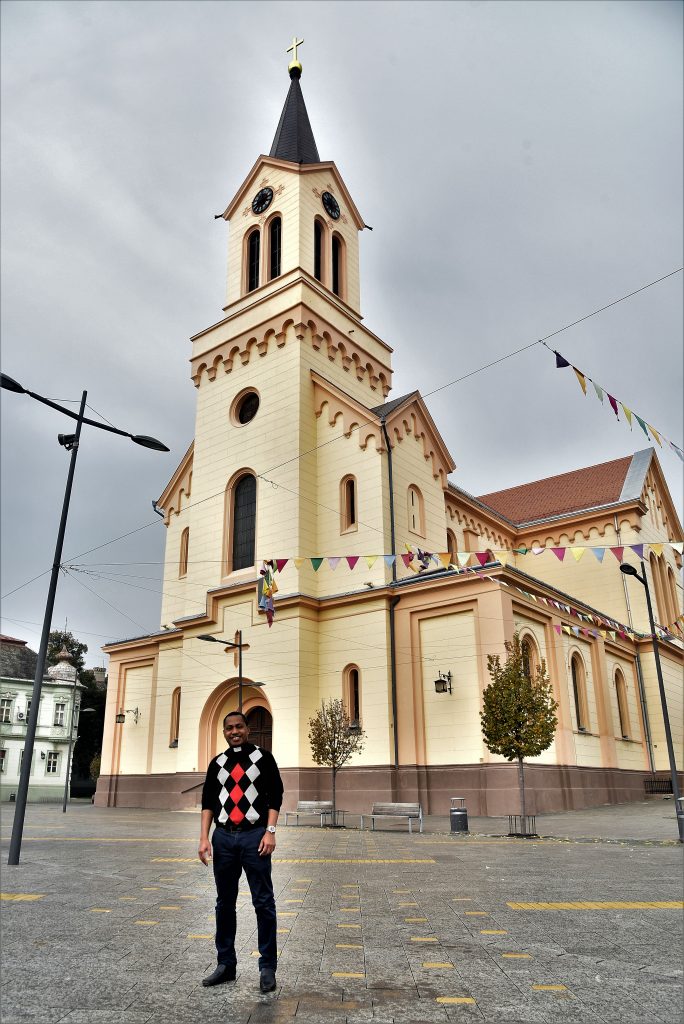A smile that conquered the Pannonian plain
A rather unusual priest lives in Zrenjanin. You can often see him in the town centre, around and about the St. Ivan Nepomuk Cathedral. He is an Indonesian, who holds service in the Hungarian language in the villages of Mihajlovo and Neuzina. His name is Father Elias Ohoiledwarin. In his Episcopal court, where he lives, we talked about the unusual destiny that brought him here, while sipping on the Indonesian coffee and tea.

You come from Indonesia, which is mostly a Muslim country but is also home to Buddhists, Hindus and Christians. In which part of Indonesia do Christians mostly live?
Hindus mostly live in Bali, Buddhists in Java, and Christians are located mostly in East Indonesia, like Timor, Flores, the Moluks and the north of Celebes. I am from a small island called Kei (Kai). Jakarta is very crowded and one of the strongest Catholic communities is in Java.
The Christians in Indonesia are mostly Catholics and Protestants since the country was a Dutch colony. When did Christianity come to Indonesia?
They are mainly Lutheran Protestants. Christianity came to Indonesia for the first time in 1511, then in 1534 by portuguese missionaries. The Protestant Churches (Lutheran and Calvinist) and the Catholic Church came to Indonesia with the Dutch missionaries when Indonesia was colonised by the Dutch in 1800 – 1942.
When did you decide to become a priest?
I grew up in a traditional Christian family where faith and God take a central place in our family life. I was an altar boy and every Sunday we helped our missionary priest. I saw there were no original Indonesian priests as all of them were missionaries. They lived a very deep Christian life, so it was then that I decided I want to be like them.

Since you attended a seminary in Indonesia, how, on earth, did you end up in Hungary, studying at the Theological University in the complicated Hungarian language? Why didn’t you choose Latin America or Italy? Their languages are much easier to learn.
It was a boy-only seminary where I started preparing to become a priest. As for the Faculty, it wasn’t my choice. I was sent to Hungary in 2002 by the Society of the Divine Word. Today there are 400-500 missionaries, working all around the world, mostly in South America, Asia and Africa. When we completed our education, we had to prepare ourselves to be missionaries abroad. Each person had to choose 2-3 countries they preferred to serve in. I never dreamt of coming to Hungary. I preferred Brazil or Africa because I liked the climate which is almost the same as the Indonesian, and the culture. In 2002, they asked me to go to Hungary. I asked where Hungary was and why were they sending me there. It was the Hungarians who asked for someone to go there. At that time, the Internet was slow, so I tried to find out more about Hungary. All I knew it was an ex-Communist country. They were in a bad situation after Communism, they didn’t have enough young priests and they wanted to rejuvenate the community. So I went there, attended a language course for 1 ½ year and started my Theology courses. It was one of the most difficult times of my life. Hungarian is one of the most difficult languages, and I struggled a lot learning it. I had a culture shock. Everything was different than in Asia. The food was very different, and then there was the climate. In Indonesia, we never have winter and snow. The first three years in Hungary were hard.
You started your service as a priest in Hungary and they moved you to Mihajlovo and Neuzina in the Serbian Banat.
I started my language course in 2002. I took my Theology classes from 2003-2007 and I was ordained to be a priest in Budapest. Later, I was sent to do service in Esztergom for about a year and a half and Kőszeg, on the border with Austria for 4 years. After that, I was sent to continue my studies in Chicago for a year and a half and later I was appointed priest in Mihajlovo (only Hungarian population lives here) and Neuzina (which is populated partly with the Hungarians).
“I feel heavenly in Banat. It’s peaceful, quiet, multicultural, open”
How did local people react?
I was in Zrenjanin for the first time in 2010 on a Mission Sunday programme. Then I came back here again in 2012 on the same mission programme. Finally, I arrived in Zrenjanin in the end of 2016. I did not speak Serbian when I came here, there for, in the first six months I took Serbian classes with a private teacher. During that times I used to go to Mihajlovo to celebrate Holy Mass, the people pray I become their priest. People in Mihajlovo were so excited when I became their priest. I love them all. Most of them are farmers; simple but very kind people.
What is life in Zrenjanin, Banat, Vojvodina, Serbia like for you?
This is a very nice country. It is so quiet. I was in Jakarta for 6 months before coming to Zrenjanin to practice, since I have never been a priest in my country. It was very strange. I asked to be a priest and preach in my language. I lived in a very crowded area. Every Sunday, we had 400 people at the church. I always held service in big cities – Jakarta, Budapest, Chicago… Zrenjanin was heavenly. I kept praying to God to send me to a quiet place, and God repeatedly failed to answer my prayers until I came to Serbia. This country is beautiful, and the people are very open. I think there is a difference between the people in Hungary and Serbia – they are much friendlier here. We have a multicultural society in Indonesia with more than 400 different ethnic groups and languages. Here, it is also multicultural, multiethnic, open. I feel fantastic. All the nations are represented here, the government recognises that and they all have their representation in the parliament. As a foreigner, I have no problems here. Also, people are used to different nationalities here. In Neuzina, mass is held in both Croatian and Hungarian, and in Vršac, mass is held in German since there is a small German community living there. It’s wonderful.
By Žikica Milošević